NMIH101 Assessment Task 3: Self-Awareness in Healthcare Communication
VerifiedAdded on 2023/06/12
|9
|3551
|353
Essay
AI Summary
This essay examines the crucial role of self-awareness for healthcare workers in establishing effective therapeutic relationships with patients. It highlights how self-awareness enables healthcare providers to understand their own values, behaviors, and emotional responses, leading to improved communication and patient care. The essay discusses the significance of self-reflection in avoiding biases and prejudices, promoting empathy, and fostering a supportive environment for patients' healing and well-being. It also explores the concept of therapeutic use of self, emphasizing the importance of verbal and non-verbal communication in building trust and motivating patients. The essay concludes by underscoring the need for ongoing self-assessment and support within healthcare settings to facilitate positive outcomes for both healthcare professionals and the individuals they serve.
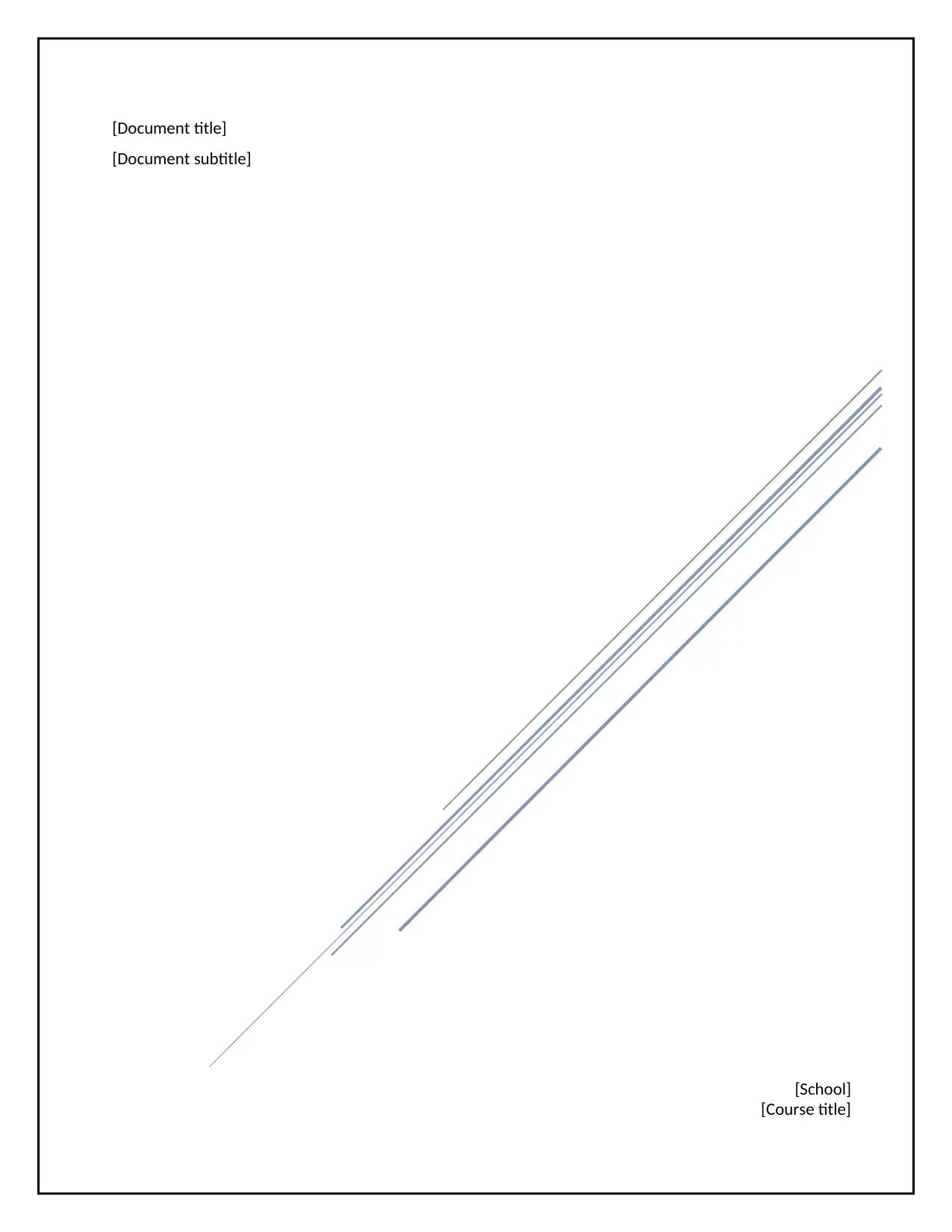
[School]
[Course title]
[Document title]
[Document subtitle]
[Course title]
[Document title]
[Document subtitle]
Paraphrase This Document
Need a fresh take? Get an instant paraphrase of this document with our AI Paraphraser
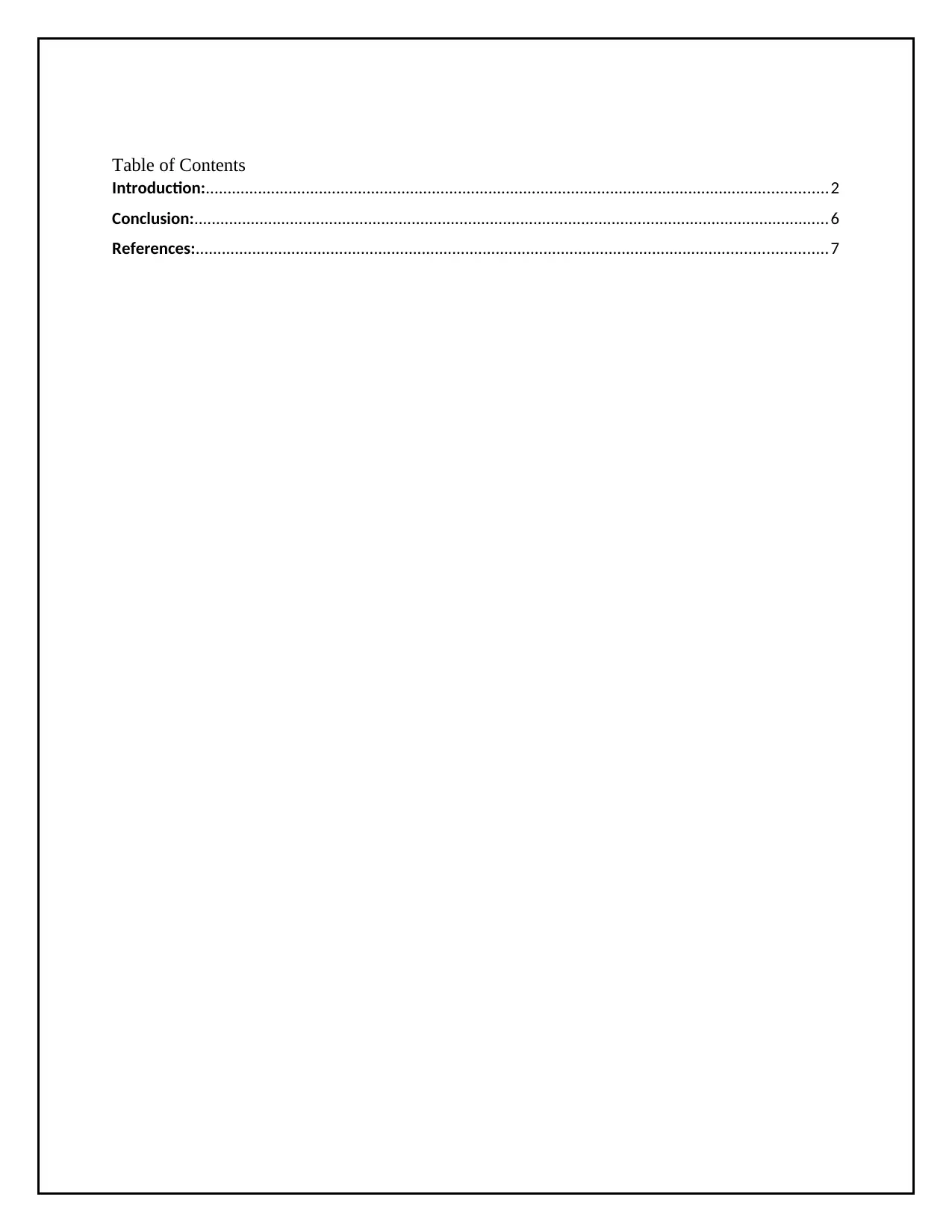
Table of Contents
Introduction:...............................................................................................................................................2
Conclusion:..................................................................................................................................................6
References:.................................................................................................................................................7
Introduction:...............................................................................................................................................2
Conclusion:..................................................................................................................................................6
References:.................................................................................................................................................7
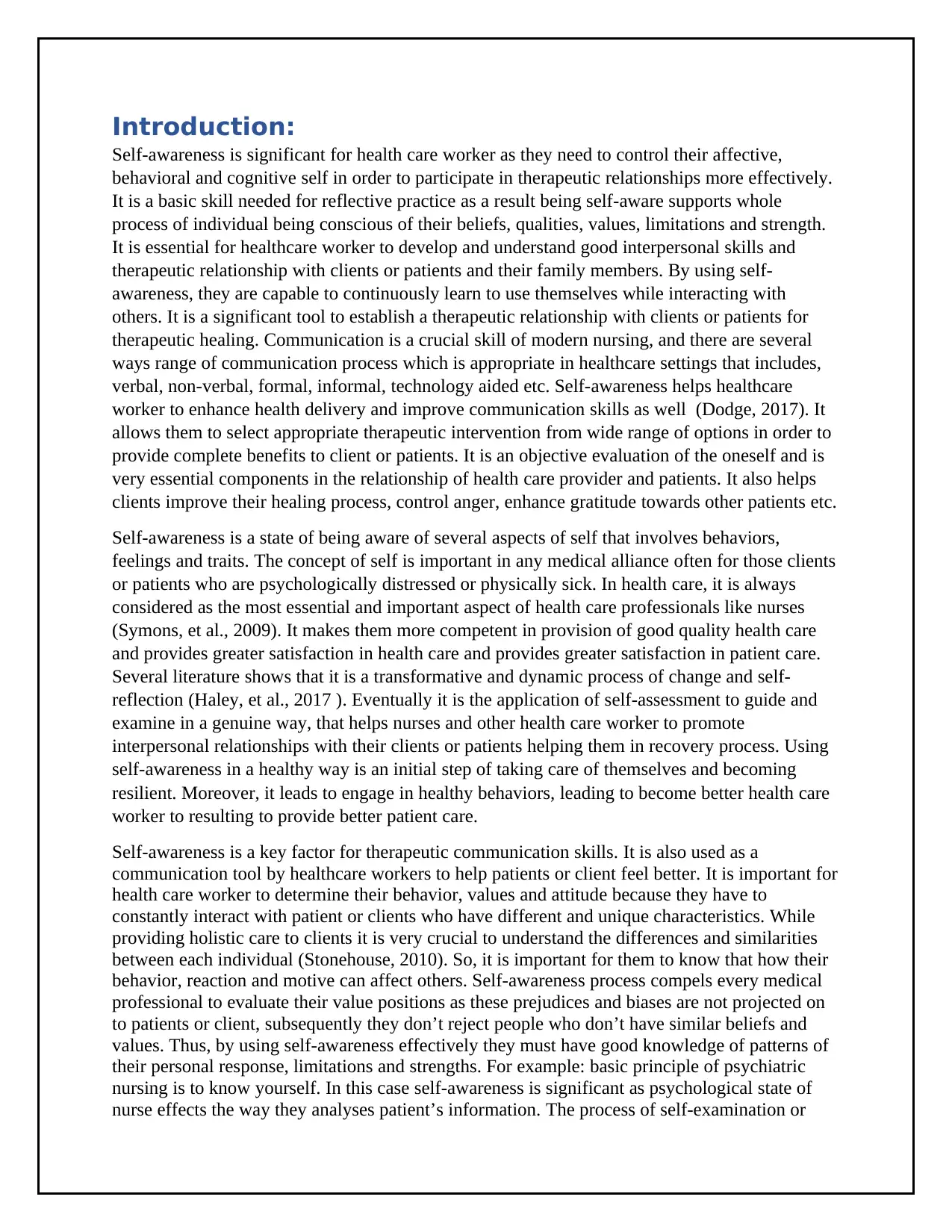
Introduction:
Self-awareness is significant for health care worker as they need to control their affective,
behavioral and cognitive self in order to participate in therapeutic relationships more effectively.
It is a basic skill needed for reflective practice as a result being self-aware supports whole
process of individual being conscious of their beliefs, qualities, values, limitations and strength.
It is essential for healthcare worker to develop and understand good interpersonal skills and
therapeutic relationship with clients or patients and their family members. By using self-
awareness, they are capable to continuously learn to use themselves while interacting with
others. It is a significant tool to establish a therapeutic relationship with clients or patients for
therapeutic healing. Communication is a crucial skill of modern nursing, and there are several
ways range of communication process which is appropriate in healthcare settings that includes,
verbal, non-verbal, formal, informal, technology aided etc. Self-awareness helps healthcare
worker to enhance health delivery and improve communication skills as well (Dodge, 2017). It
allows them to select appropriate therapeutic intervention from wide range of options in order to
provide complete benefits to client or patients. It is an objective evaluation of the oneself and is
very essential components in the relationship of health care provider and patients. It also helps
clients improve their healing process, control anger, enhance gratitude towards other patients etc.
Self-awareness is a state of being aware of several aspects of self that involves behaviors,
feelings and traits. The concept of self is important in any medical alliance often for those clients
or patients who are psychologically distressed or physically sick. In health care, it is always
considered as the most essential and important aspect of health care professionals like nurses
(Symons, et al., 2009). It makes them more competent in provision of good quality health care
and provides greater satisfaction in health care and provides greater satisfaction in patient care.
Several literature shows that it is a transformative and dynamic process of change and self-
reflection (Haley, et al., 2017 ). Eventually it is the application of self-assessment to guide and
examine in a genuine way, that helps nurses and other health care worker to promote
interpersonal relationships with their clients or patients helping them in recovery process. Using
self-awareness in a healthy way is an initial step of taking care of themselves and becoming
resilient. Moreover, it leads to engage in healthy behaviors, leading to become better health care
worker to resulting to provide better patient care.
Self-awareness is a key factor for therapeutic communication skills. It is also used as a
communication tool by healthcare workers to help patients or client feel better. It is important for
health care worker to determine their behavior, values and attitude because they have to
constantly interact with patient or clients who have different and unique characteristics. While
providing holistic care to clients it is very crucial to understand the differences and similarities
between each individual (Stonehouse, 2010). So, it is important for them to know that how their
behavior, reaction and motive can affect others. Self-awareness process compels every medical
professional to evaluate their value positions as these prejudices and biases are not projected on
to patients or client, subsequently they don’t reject people who don’t have similar beliefs and
values. Thus, by using self-awareness effectively they must have good knowledge of patterns of
their personal response, limitations and strengths. For example: basic principle of psychiatric
nursing is to know yourself. In this case self-awareness is significant as psychological state of
nurse effects the way they analyses patient’s information. The process of self-examination or
Self-awareness is significant for health care worker as they need to control their affective,
behavioral and cognitive self in order to participate in therapeutic relationships more effectively.
It is a basic skill needed for reflective practice as a result being self-aware supports whole
process of individual being conscious of their beliefs, qualities, values, limitations and strength.
It is essential for healthcare worker to develop and understand good interpersonal skills and
therapeutic relationship with clients or patients and their family members. By using self-
awareness, they are capable to continuously learn to use themselves while interacting with
others. It is a significant tool to establish a therapeutic relationship with clients or patients for
therapeutic healing. Communication is a crucial skill of modern nursing, and there are several
ways range of communication process which is appropriate in healthcare settings that includes,
verbal, non-verbal, formal, informal, technology aided etc. Self-awareness helps healthcare
worker to enhance health delivery and improve communication skills as well (Dodge, 2017). It
allows them to select appropriate therapeutic intervention from wide range of options in order to
provide complete benefits to client or patients. It is an objective evaluation of the oneself and is
very essential components in the relationship of health care provider and patients. It also helps
clients improve their healing process, control anger, enhance gratitude towards other patients etc.
Self-awareness is a state of being aware of several aspects of self that involves behaviors,
feelings and traits. The concept of self is important in any medical alliance often for those clients
or patients who are psychologically distressed or physically sick. In health care, it is always
considered as the most essential and important aspect of health care professionals like nurses
(Symons, et al., 2009). It makes them more competent in provision of good quality health care
and provides greater satisfaction in health care and provides greater satisfaction in patient care.
Several literature shows that it is a transformative and dynamic process of change and self-
reflection (Haley, et al., 2017 ). Eventually it is the application of self-assessment to guide and
examine in a genuine way, that helps nurses and other health care worker to promote
interpersonal relationships with their clients or patients helping them in recovery process. Using
self-awareness in a healthy way is an initial step of taking care of themselves and becoming
resilient. Moreover, it leads to engage in healthy behaviors, leading to become better health care
worker to resulting to provide better patient care.
Self-awareness is a key factor for therapeutic communication skills. It is also used as a
communication tool by healthcare workers to help patients or client feel better. It is important for
health care worker to determine their behavior, values and attitude because they have to
constantly interact with patient or clients who have different and unique characteristics. While
providing holistic care to clients it is very crucial to understand the differences and similarities
between each individual (Stonehouse, 2010). So, it is important for them to know that how their
behavior, reaction and motive can affect others. Self-awareness process compels every medical
professional to evaluate their value positions as these prejudices and biases are not projected on
to patients or client, subsequently they don’t reject people who don’t have similar beliefs and
values. Thus, by using self-awareness effectively they must have good knowledge of patterns of
their personal response, limitations and strengths. For example: basic principle of psychiatric
nursing is to know yourself. In this case self-awareness is significant as psychological state of
nurse effects the way they analyses patient’s information. The process of self-examination or
⊘ This is a preview!⊘
Do you want full access?
Subscribe today to unlock all pages.

Trusted by 1+ million students worldwide
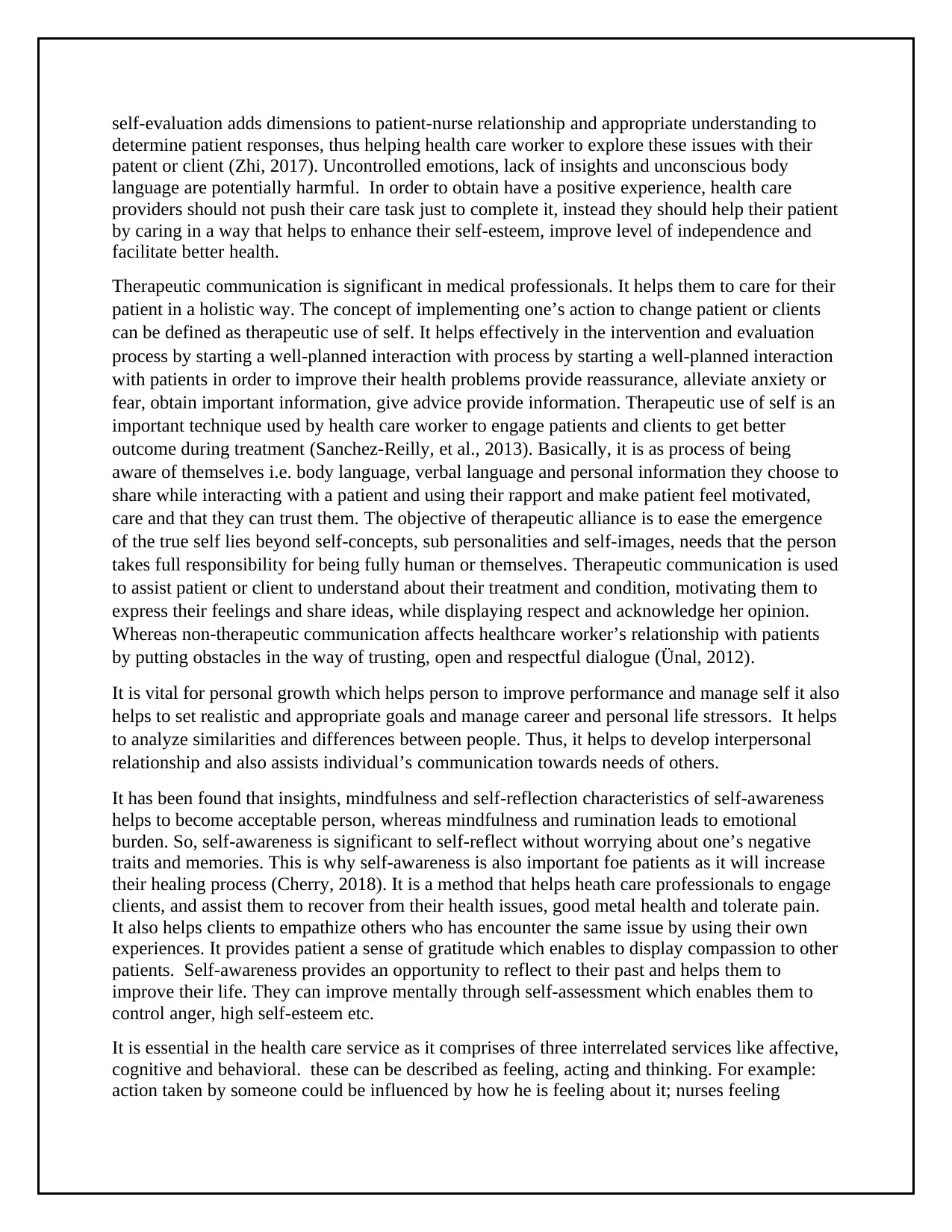
self-evaluation adds dimensions to patient-nurse relationship and appropriate understanding to
determine patient responses, thus helping health care worker to explore these issues with their
patent or client (Zhi, 2017). Uncontrolled emotions, lack of insights and unconscious body
language are potentially harmful. In order to obtain have a positive experience, health care
providers should not push their care task just to complete it, instead they should help their patient
by caring in a way that helps to enhance their self-esteem, improve level of independence and
facilitate better health.
Therapeutic communication is significant in medical professionals. It helps them to care for their
patient in a holistic way. The concept of implementing one’s action to change patient or clients
can be defined as therapeutic use of self. It helps effectively in the intervention and evaluation
process by starting a well-planned interaction with process by starting a well-planned interaction
with patients in order to improve their health problems provide reassurance, alleviate anxiety or
fear, obtain important information, give advice provide information. Therapeutic use of self is an
important technique used by health care worker to engage patients and clients to get better
outcome during treatment (Sanchez-Reilly, et al., 2013). Basically, it is as process of being
aware of themselves i.e. body language, verbal language and personal information they choose to
share while interacting with a patient and using their rapport and make patient feel motivated,
care and that they can trust them. The objective of therapeutic alliance is to ease the emergence
of the true self lies beyond self-concepts, sub personalities and self-images, needs that the person
takes full responsibility for being fully human or themselves. Therapeutic communication is used
to assist patient or client to understand about their treatment and condition, motivating them to
express their feelings and share ideas, while displaying respect and acknowledge her opinion.
Whereas non-therapeutic communication affects healthcare worker’s relationship with patients
by putting obstacles in the way of trusting, open and respectful dialogue (Ünal, 2012).
It is vital for personal growth which helps person to improve performance and manage self it also
helps to set realistic and appropriate goals and manage career and personal life stressors. It helps
to analyze similarities and differences between people. Thus, it helps to develop interpersonal
relationship and also assists individual’s communication towards needs of others.
It has been found that insights, mindfulness and self-reflection characteristics of self-awareness
helps to become acceptable person, whereas mindfulness and rumination leads to emotional
burden. So, self-awareness is significant to self-reflect without worrying about one’s negative
traits and memories. This is why self-awareness is also important foe patients as it will increase
their healing process (Cherry, 2018). It is a method that helps heath care professionals to engage
clients, and assist them to recover from their health issues, good metal health and tolerate pain.
It also helps clients to empathize others who has encounter the same issue by using their own
experiences. It provides patient a sense of gratitude which enables to display compassion to other
patients. Self-awareness provides an opportunity to reflect to their past and helps them to
improve their life. They can improve mentally through self-assessment which enables them to
control anger, high self-esteem etc.
It is essential in the health care service as it comprises of three interrelated services like affective,
cognitive and behavioral. these can be described as feeling, acting and thinking. For example:
action taken by someone could be influenced by how he is feeling about it; nurses feeling
determine patient responses, thus helping health care worker to explore these issues with their
patent or client (Zhi, 2017). Uncontrolled emotions, lack of insights and unconscious body
language are potentially harmful. In order to obtain have a positive experience, health care
providers should not push their care task just to complete it, instead they should help their patient
by caring in a way that helps to enhance their self-esteem, improve level of independence and
facilitate better health.
Therapeutic communication is significant in medical professionals. It helps them to care for their
patient in a holistic way. The concept of implementing one’s action to change patient or clients
can be defined as therapeutic use of self. It helps effectively in the intervention and evaluation
process by starting a well-planned interaction with process by starting a well-planned interaction
with patients in order to improve their health problems provide reassurance, alleviate anxiety or
fear, obtain important information, give advice provide information. Therapeutic use of self is an
important technique used by health care worker to engage patients and clients to get better
outcome during treatment (Sanchez-Reilly, et al., 2013). Basically, it is as process of being
aware of themselves i.e. body language, verbal language and personal information they choose to
share while interacting with a patient and using their rapport and make patient feel motivated,
care and that they can trust them. The objective of therapeutic alliance is to ease the emergence
of the true self lies beyond self-concepts, sub personalities and self-images, needs that the person
takes full responsibility for being fully human or themselves. Therapeutic communication is used
to assist patient or client to understand about their treatment and condition, motivating them to
express their feelings and share ideas, while displaying respect and acknowledge her opinion.
Whereas non-therapeutic communication affects healthcare worker’s relationship with patients
by putting obstacles in the way of trusting, open and respectful dialogue (Ünal, 2012).
It is vital for personal growth which helps person to improve performance and manage self it also
helps to set realistic and appropriate goals and manage career and personal life stressors. It helps
to analyze similarities and differences between people. Thus, it helps to develop interpersonal
relationship and also assists individual’s communication towards needs of others.
It has been found that insights, mindfulness and self-reflection characteristics of self-awareness
helps to become acceptable person, whereas mindfulness and rumination leads to emotional
burden. So, self-awareness is significant to self-reflect without worrying about one’s negative
traits and memories. This is why self-awareness is also important foe patients as it will increase
their healing process (Cherry, 2018). It is a method that helps heath care professionals to engage
clients, and assist them to recover from their health issues, good metal health and tolerate pain.
It also helps clients to empathize others who has encounter the same issue by using their own
experiences. It provides patient a sense of gratitude which enables to display compassion to other
patients. Self-awareness provides an opportunity to reflect to their past and helps them to
improve their life. They can improve mentally through self-assessment which enables them to
control anger, high self-esteem etc.
It is essential in the health care service as it comprises of three interrelated services like affective,
cognitive and behavioral. these can be described as feeling, acting and thinking. For example:
action taken by someone could be influenced by how he is feeling about it; nurses feeling
Paraphrase This Document
Need a fresh take? Get an instant paraphrase of this document with our AI Paraphraser
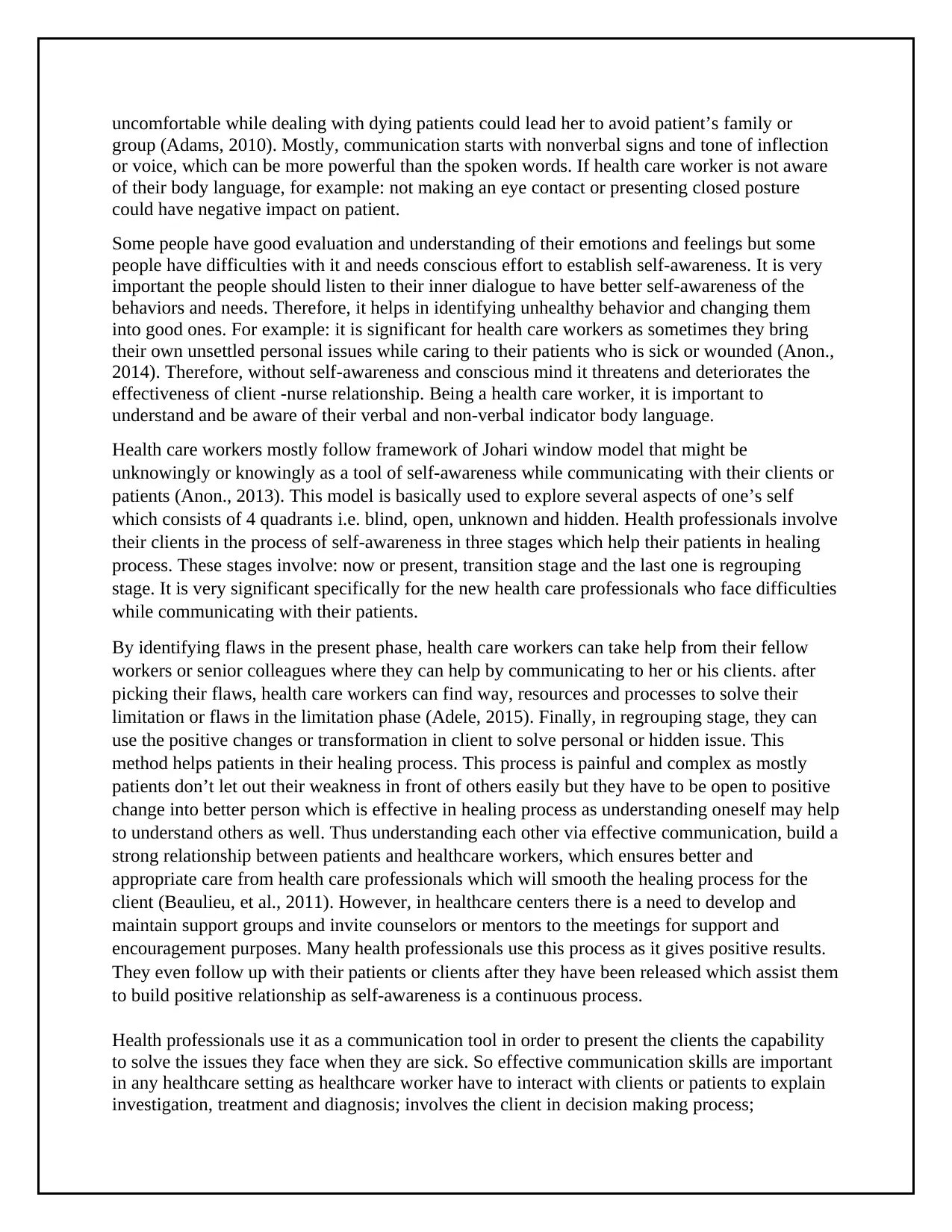
uncomfortable while dealing with dying patients could lead her to avoid patient’s family or
group (Adams, 2010). Mostly, communication starts with nonverbal signs and tone of inflection
or voice, which can be more powerful than the spoken words. If health care worker is not aware
of their body language, for example: not making an eye contact or presenting closed posture
could have negative impact on patient.
Some people have good evaluation and understanding of their emotions and feelings but some
people have difficulties with it and needs conscious effort to establish self-awareness. It is very
important the people should listen to their inner dialogue to have better self-awareness of the
behaviors and needs. Therefore, it helps in identifying unhealthy behavior and changing them
into good ones. For example: it is significant for health care workers as sometimes they bring
their own unsettled personal issues while caring to their patients who is sick or wounded (Anon.,
2014). Therefore, without self-awareness and conscious mind it threatens and deteriorates the
effectiveness of client -nurse relationship. Being a health care worker, it is important to
understand and be aware of their verbal and non-verbal indicator body language.
Health care workers mostly follow framework of Johari window model that might be
unknowingly or knowingly as a tool of self-awareness while communicating with their clients or
patients (Anon., 2013). This model is basically used to explore several aspects of one’s self
which consists of 4 quadrants i.e. blind, open, unknown and hidden. Health professionals involve
their clients in the process of self-awareness in three stages which help their patients in healing
process. These stages involve: now or present, transition stage and the last one is regrouping
stage. It is very significant specifically for the new health care professionals who face difficulties
while communicating with their patients.
By identifying flaws in the present phase, health care workers can take help from their fellow
workers or senior colleagues where they can help by communicating to her or his clients. after
picking their flaws, health care workers can find way, resources and processes to solve their
limitation or flaws in the limitation phase (Adele, 2015). Finally, in regrouping stage, they can
use the positive changes or transformation in client to solve personal or hidden issue. This
method helps patients in their healing process. This process is painful and complex as mostly
patients don’t let out their weakness in front of others easily but they have to be open to positive
change into better person which is effective in healing process as understanding oneself may help
to understand others as well. Thus understanding each other via effective communication, build a
strong relationship between patients and healthcare workers, which ensures better and
appropriate care from health care professionals which will smooth the healing process for the
client (Beaulieu, et al., 2011). However, in healthcare centers there is a need to develop and
maintain support groups and invite counselors or mentors to the meetings for support and
encouragement purposes. Many health professionals use this process as it gives positive results.
They even follow up with their patients or clients after they have been released which assist them
to build positive relationship as self-awareness is a continuous process.
Health professionals use it as a communication tool in order to present the clients the capability
to solve the issues they face when they are sick. So effective communication skills are important
in any healthcare setting as healthcare worker have to interact with clients or patients to explain
investigation, treatment and diagnosis; involves the client in decision making process;
group (Adams, 2010). Mostly, communication starts with nonverbal signs and tone of inflection
or voice, which can be more powerful than the spoken words. If health care worker is not aware
of their body language, for example: not making an eye contact or presenting closed posture
could have negative impact on patient.
Some people have good evaluation and understanding of their emotions and feelings but some
people have difficulties with it and needs conscious effort to establish self-awareness. It is very
important the people should listen to their inner dialogue to have better self-awareness of the
behaviors and needs. Therefore, it helps in identifying unhealthy behavior and changing them
into good ones. For example: it is significant for health care workers as sometimes they bring
their own unsettled personal issues while caring to their patients who is sick or wounded (Anon.,
2014). Therefore, without self-awareness and conscious mind it threatens and deteriorates the
effectiveness of client -nurse relationship. Being a health care worker, it is important to
understand and be aware of their verbal and non-verbal indicator body language.
Health care workers mostly follow framework of Johari window model that might be
unknowingly or knowingly as a tool of self-awareness while communicating with their clients or
patients (Anon., 2013). This model is basically used to explore several aspects of one’s self
which consists of 4 quadrants i.e. blind, open, unknown and hidden. Health professionals involve
their clients in the process of self-awareness in three stages which help their patients in healing
process. These stages involve: now or present, transition stage and the last one is regrouping
stage. It is very significant specifically for the new health care professionals who face difficulties
while communicating with their patients.
By identifying flaws in the present phase, health care workers can take help from their fellow
workers or senior colleagues where they can help by communicating to her or his clients. after
picking their flaws, health care workers can find way, resources and processes to solve their
limitation or flaws in the limitation phase (Adele, 2015). Finally, in regrouping stage, they can
use the positive changes or transformation in client to solve personal or hidden issue. This
method helps patients in their healing process. This process is painful and complex as mostly
patients don’t let out their weakness in front of others easily but they have to be open to positive
change into better person which is effective in healing process as understanding oneself may help
to understand others as well. Thus understanding each other via effective communication, build a
strong relationship between patients and healthcare workers, which ensures better and
appropriate care from health care professionals which will smooth the healing process for the
client (Beaulieu, et al., 2011). However, in healthcare centers there is a need to develop and
maintain support groups and invite counselors or mentors to the meetings for support and
encouragement purposes. Many health professionals use this process as it gives positive results.
They even follow up with their patients or clients after they have been released which assist them
to build positive relationship as self-awareness is a continuous process.
Health professionals use it as a communication tool in order to present the clients the capability
to solve the issues they face when they are sick. So effective communication skills are important
in any healthcare setting as healthcare worker have to interact with clients or patients to explain
investigation, treatment and diagnosis; involves the client in decision making process;
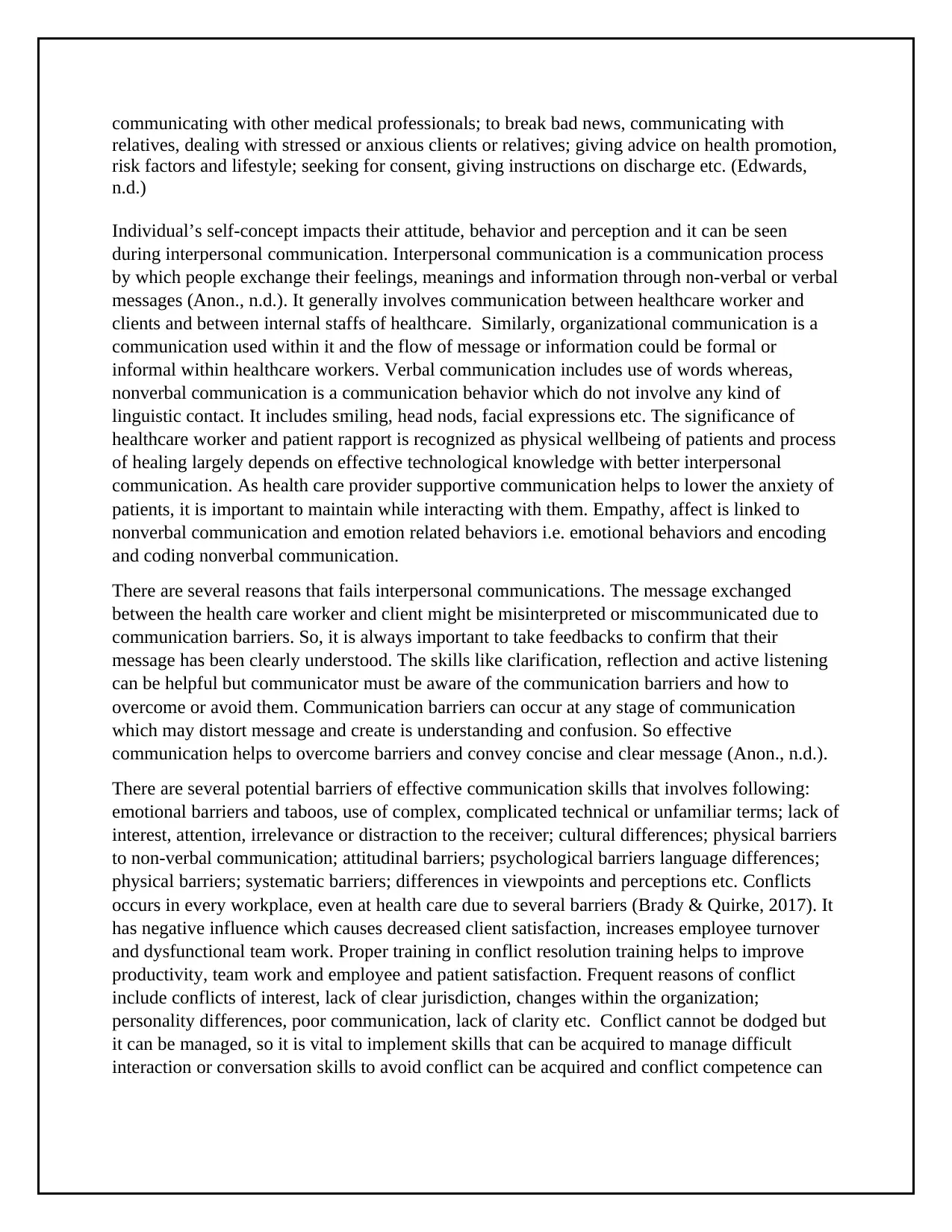
communicating with other medical professionals; to break bad news, communicating with
relatives, dealing with stressed or anxious clients or relatives; giving advice on health promotion,
risk factors and lifestyle; seeking for consent, giving instructions on discharge etc. (Edwards,
n.d.)
Individual’s self-concept impacts their attitude, behavior and perception and it can be seen
during interpersonal communication. Interpersonal communication is a communication process
by which people exchange their feelings, meanings and information through non-verbal or verbal
messages (Anon., n.d.). It generally involves communication between healthcare worker and
clients and between internal staffs of healthcare. Similarly, organizational communication is a
communication used within it and the flow of message or information could be formal or
informal within healthcare workers. Verbal communication includes use of words whereas,
nonverbal communication is a communication behavior which do not involve any kind of
linguistic contact. It includes smiling, head nods, facial expressions etc. The significance of
healthcare worker and patient rapport is recognized as physical wellbeing of patients and process
of healing largely depends on effective technological knowledge with better interpersonal
communication. As health care provider supportive communication helps to lower the anxiety of
patients, it is important to maintain while interacting with them. Empathy, affect is linked to
nonverbal communication and emotion related behaviors i.e. emotional behaviors and encoding
and coding nonverbal communication.
There are several reasons that fails interpersonal communications. The message exchanged
between the health care worker and client might be misinterpreted or miscommunicated due to
communication barriers. So, it is always important to take feedbacks to confirm that their
message has been clearly understood. The skills like clarification, reflection and active listening
can be helpful but communicator must be aware of the communication barriers and how to
overcome or avoid them. Communication barriers can occur at any stage of communication
which may distort message and create is understanding and confusion. So effective
communication helps to overcome barriers and convey concise and clear message (Anon., n.d.).
There are several potential barriers of effective communication skills that involves following:
emotional barriers and taboos, use of complex, complicated technical or unfamiliar terms; lack of
interest, attention, irrelevance or distraction to the receiver; cultural differences; physical barriers
to non-verbal communication; attitudinal barriers; psychological barriers language differences;
physical barriers; systematic barriers; differences in viewpoints and perceptions etc. Conflicts
occurs in every workplace, even at health care due to several barriers (Brady & Quirke, 2017). It
has negative influence which causes decreased client satisfaction, increases employee turnover
and dysfunctional team work. Proper training in conflict resolution training helps to improve
productivity, team work and employee and patient satisfaction. Frequent reasons of conflict
include conflicts of interest, lack of clear jurisdiction, changes within the organization;
personality differences, poor communication, lack of clarity etc. Conflict cannot be dodged but
it can be managed, so it is vital to implement skills that can be acquired to manage difficult
interaction or conversation skills to avoid conflict can be acquired and conflict competence can
relatives, dealing with stressed or anxious clients or relatives; giving advice on health promotion,
risk factors and lifestyle; seeking for consent, giving instructions on discharge etc. (Edwards,
n.d.)
Individual’s self-concept impacts their attitude, behavior and perception and it can be seen
during interpersonal communication. Interpersonal communication is a communication process
by which people exchange their feelings, meanings and information through non-verbal or verbal
messages (Anon., n.d.). It generally involves communication between healthcare worker and
clients and between internal staffs of healthcare. Similarly, organizational communication is a
communication used within it and the flow of message or information could be formal or
informal within healthcare workers. Verbal communication includes use of words whereas,
nonverbal communication is a communication behavior which do not involve any kind of
linguistic contact. It includes smiling, head nods, facial expressions etc. The significance of
healthcare worker and patient rapport is recognized as physical wellbeing of patients and process
of healing largely depends on effective technological knowledge with better interpersonal
communication. As health care provider supportive communication helps to lower the anxiety of
patients, it is important to maintain while interacting with them. Empathy, affect is linked to
nonverbal communication and emotion related behaviors i.e. emotional behaviors and encoding
and coding nonverbal communication.
There are several reasons that fails interpersonal communications. The message exchanged
between the health care worker and client might be misinterpreted or miscommunicated due to
communication barriers. So, it is always important to take feedbacks to confirm that their
message has been clearly understood. The skills like clarification, reflection and active listening
can be helpful but communicator must be aware of the communication barriers and how to
overcome or avoid them. Communication barriers can occur at any stage of communication
which may distort message and create is understanding and confusion. So effective
communication helps to overcome barriers and convey concise and clear message (Anon., n.d.).
There are several potential barriers of effective communication skills that involves following:
emotional barriers and taboos, use of complex, complicated technical or unfamiliar terms; lack of
interest, attention, irrelevance or distraction to the receiver; cultural differences; physical barriers
to non-verbal communication; attitudinal barriers; psychological barriers language differences;
physical barriers; systematic barriers; differences in viewpoints and perceptions etc. Conflicts
occurs in every workplace, even at health care due to several barriers (Brady & Quirke, 2017). It
has negative influence which causes decreased client satisfaction, increases employee turnover
and dysfunctional team work. Proper training in conflict resolution training helps to improve
productivity, team work and employee and patient satisfaction. Frequent reasons of conflict
include conflicts of interest, lack of clear jurisdiction, changes within the organization;
personality differences, poor communication, lack of clarity etc. Conflict cannot be dodged but
it can be managed, so it is vital to implement skills that can be acquired to manage difficult
interaction or conversation skills to avoid conflict can be acquired and conflict competence can
⊘ This is a preview!⊘
Do you want full access?
Subscribe today to unlock all pages.

Trusted by 1+ million students worldwide
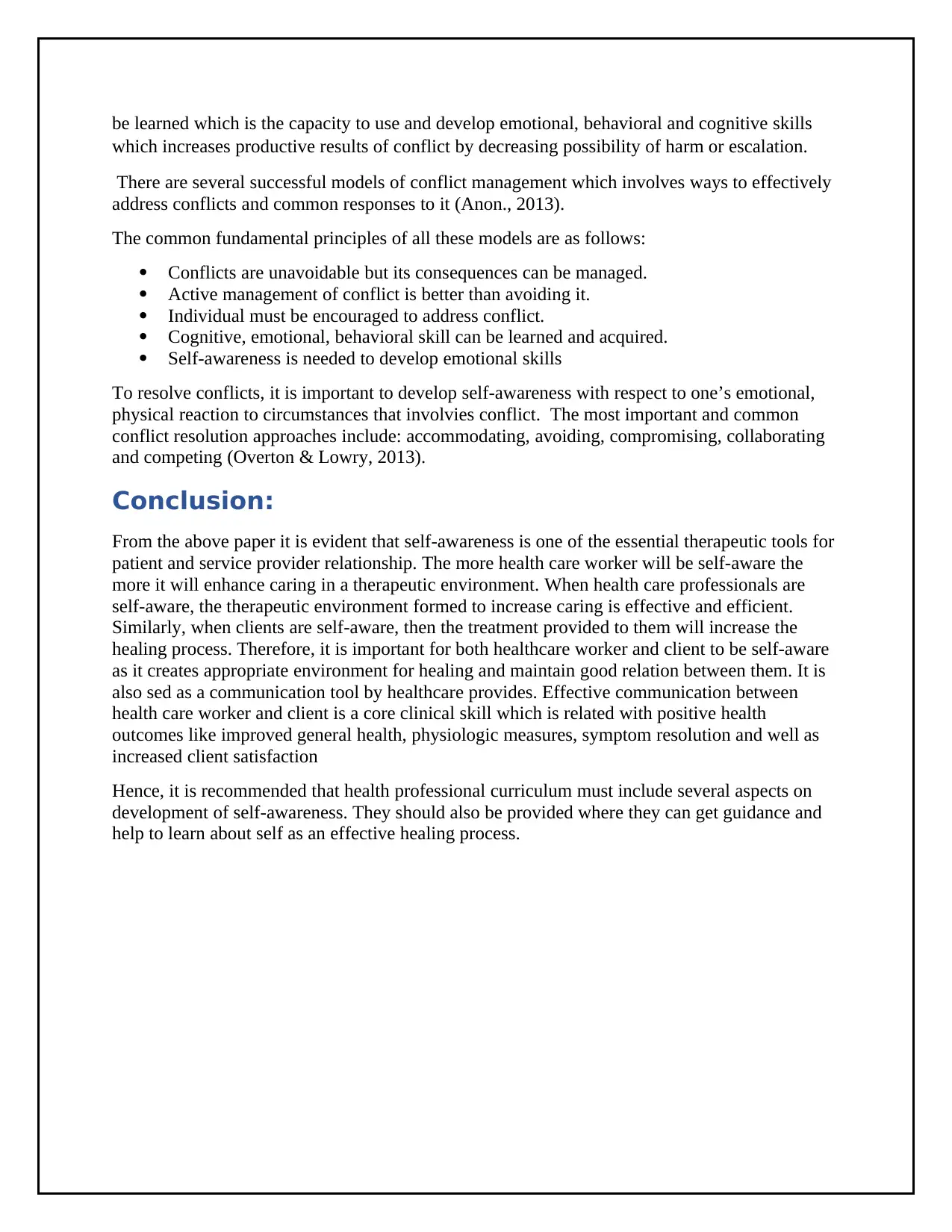
be learned which is the capacity to use and develop emotional, behavioral and cognitive skills
which increases productive results of conflict by decreasing possibility of harm or escalation.
There are several successful models of conflict management which involves ways to effectively
address conflicts and common responses to it (Anon., 2013).
The common fundamental principles of all these models are as follows:
Conflicts are unavoidable but its consequences can be managed.
Active management of conflict is better than avoiding it.
Individual must be encouraged to address conflict.
Cognitive, emotional, behavioral skill can be learned and acquired.
Self-awareness is needed to develop emotional skills
To resolve conflicts, it is important to develop self-awareness with respect to one’s emotional,
physical reaction to circumstances that involvies conflict. The most important and common
conflict resolution approaches include: accommodating, avoiding, compromising, collaborating
and competing (Overton & Lowry, 2013).
Conclusion:
From the above paper it is evident that self-awareness is one of the essential therapeutic tools for
patient and service provider relationship. The more health care worker will be self-aware the
more it will enhance caring in a therapeutic environment. When health care professionals are
self-aware, the therapeutic environment formed to increase caring is effective and efficient.
Similarly, when clients are self-aware, then the treatment provided to them will increase the
healing process. Therefore, it is important for both healthcare worker and client to be self-aware
as it creates appropriate environment for healing and maintain good relation between them. It is
also sed as a communication tool by healthcare provides. Effective communication between
health care worker and client is a core clinical skill which is related with positive health
outcomes like improved general health, physiologic measures, symptom resolution and well as
increased client satisfaction
Hence, it is recommended that health professional curriculum must include several aspects on
development of self-awareness. They should also be provided where they can get guidance and
help to learn about self as an effective healing process.
which increases productive results of conflict by decreasing possibility of harm or escalation.
There are several successful models of conflict management which involves ways to effectively
address conflicts and common responses to it (Anon., 2013).
The common fundamental principles of all these models are as follows:
Conflicts are unavoidable but its consequences can be managed.
Active management of conflict is better than avoiding it.
Individual must be encouraged to address conflict.
Cognitive, emotional, behavioral skill can be learned and acquired.
Self-awareness is needed to develop emotional skills
To resolve conflicts, it is important to develop self-awareness with respect to one’s emotional,
physical reaction to circumstances that involvies conflict. The most important and common
conflict resolution approaches include: accommodating, avoiding, compromising, collaborating
and competing (Overton & Lowry, 2013).
Conclusion:
From the above paper it is evident that self-awareness is one of the essential therapeutic tools for
patient and service provider relationship. The more health care worker will be self-aware the
more it will enhance caring in a therapeutic environment. When health care professionals are
self-aware, the therapeutic environment formed to increase caring is effective and efficient.
Similarly, when clients are self-aware, then the treatment provided to them will increase the
healing process. Therefore, it is important for both healthcare worker and client to be self-aware
as it creates appropriate environment for healing and maintain good relation between them. It is
also sed as a communication tool by healthcare provides. Effective communication between
health care worker and client is a core clinical skill which is related with positive health
outcomes like improved general health, physiologic measures, symptom resolution and well as
increased client satisfaction
Hence, it is recommended that health professional curriculum must include several aspects on
development of self-awareness. They should also be provided where they can get guidance and
help to learn about self as an effective healing process.
Paraphrase This Document
Need a fresh take? Get an instant paraphrase of this document with our AI Paraphraser
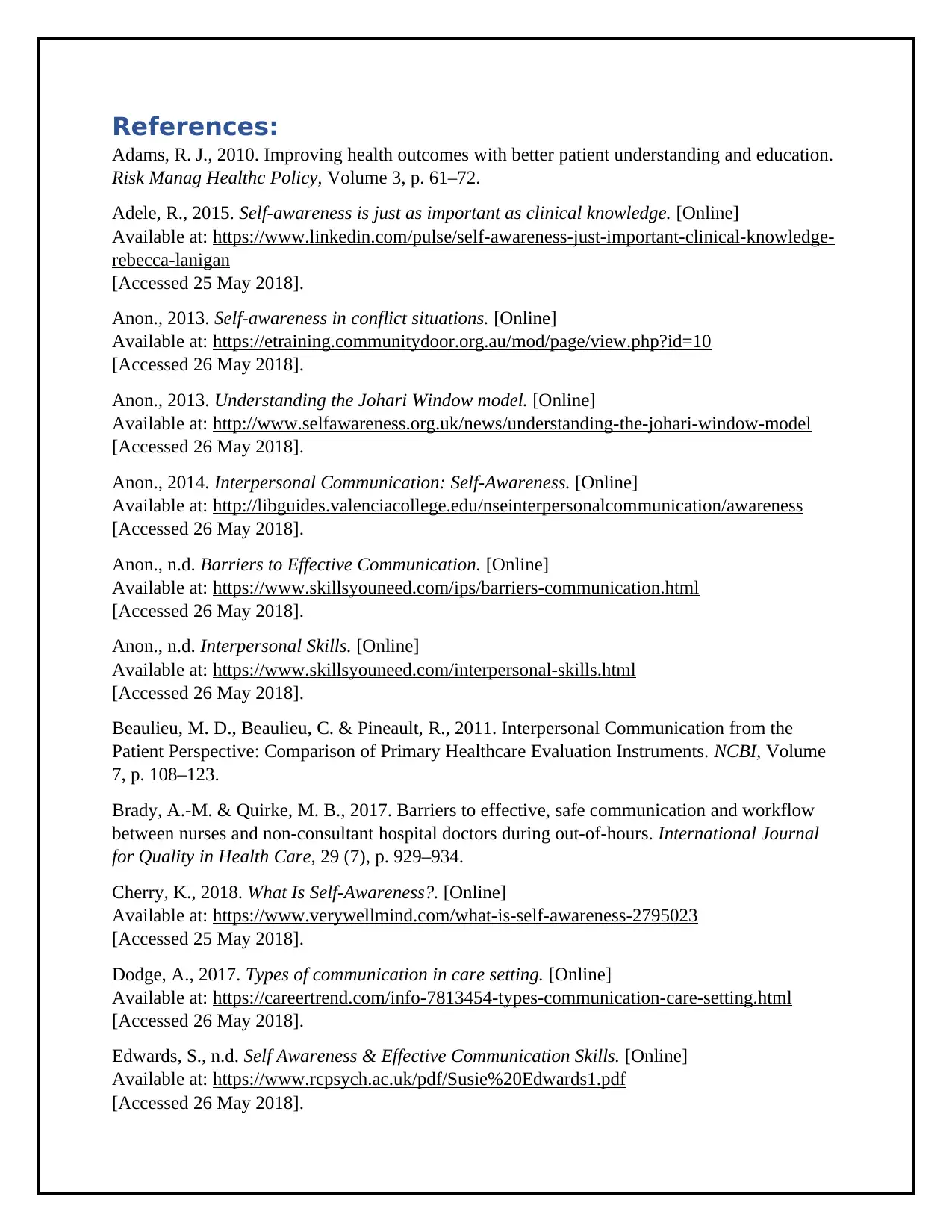
References:
Adams, R. J., 2010. Improving health outcomes with better patient understanding and education.
Risk Manag Healthc Policy, Volume 3, p. 61–72.
Adele, R., 2015. Self-awareness is just as important as clinical knowledge. [Online]
Available at: https://www.linkedin.com/pulse/self-awareness-just-important-clinical-knowledge-
rebecca-lanigan
[Accessed 25 May 2018].
Anon., 2013. Self-awareness in conflict situations. [Online]
Available at: https://etraining.communitydoor.org.au/mod/page/view.php?id=10
[Accessed 26 May 2018].
Anon., 2013. Understanding the Johari Window model. [Online]
Available at: http://www.selfawareness.org.uk/news/understanding-the-johari-window-model
[Accessed 26 May 2018].
Anon., 2014. Interpersonal Communication: Self-Awareness. [Online]
Available at: http://libguides.valenciacollege.edu/nseinterpersonalcommunication/awareness
[Accessed 26 May 2018].
Anon., n.d. Barriers to Effective Communication. [Online]
Available at: https://www.skillsyouneed.com/ips/barriers-communication.html
[Accessed 26 May 2018].
Anon., n.d. Interpersonal Skills. [Online]
Available at: https://www.skillsyouneed.com/interpersonal-skills.html
[Accessed 26 May 2018].
Beaulieu, M. D., Beaulieu, C. & Pineault, R., 2011. Interpersonal Communication from the
Patient Perspective: Comparison of Primary Healthcare Evaluation Instruments. NCBI, Volume
7, p. 108–123.
Brady, A.-M. & Quirke, M. B., 2017. Barriers to effective, safe communication and workflow
between nurses and non-consultant hospital doctors during out-of-hours. International Journal
for Quality in Health Care, 29 (7), p. 929–934.
Cherry, K., 2018. What Is Self-Awareness?. [Online]
Available at: https://www.verywellmind.com/what-is-self-awareness-2795023
[Accessed 25 May 2018].
Dodge, A., 2017. Types of communication in care setting. [Online]
Available at: https://careertrend.com/info-7813454-types-communication-care-setting.html
[Accessed 26 May 2018].
Edwards, S., n.d. Self Awareness & Effective Communication Skills. [Online]
Available at: https://www.rcpsych.ac.uk/pdf/Susie%20Edwards1.pdf
[Accessed 26 May 2018].
Adams, R. J., 2010. Improving health outcomes with better patient understanding and education.
Risk Manag Healthc Policy, Volume 3, p. 61–72.
Adele, R., 2015. Self-awareness is just as important as clinical knowledge. [Online]
Available at: https://www.linkedin.com/pulse/self-awareness-just-important-clinical-knowledge-
rebecca-lanigan
[Accessed 25 May 2018].
Anon., 2013. Self-awareness in conflict situations. [Online]
Available at: https://etraining.communitydoor.org.au/mod/page/view.php?id=10
[Accessed 26 May 2018].
Anon., 2013. Understanding the Johari Window model. [Online]
Available at: http://www.selfawareness.org.uk/news/understanding-the-johari-window-model
[Accessed 26 May 2018].
Anon., 2014. Interpersonal Communication: Self-Awareness. [Online]
Available at: http://libguides.valenciacollege.edu/nseinterpersonalcommunication/awareness
[Accessed 26 May 2018].
Anon., n.d. Barriers to Effective Communication. [Online]
Available at: https://www.skillsyouneed.com/ips/barriers-communication.html
[Accessed 26 May 2018].
Anon., n.d. Interpersonal Skills. [Online]
Available at: https://www.skillsyouneed.com/interpersonal-skills.html
[Accessed 26 May 2018].
Beaulieu, M. D., Beaulieu, C. & Pineault, R., 2011. Interpersonal Communication from the
Patient Perspective: Comparison of Primary Healthcare Evaluation Instruments. NCBI, Volume
7, p. 108–123.
Brady, A.-M. & Quirke, M. B., 2017. Barriers to effective, safe communication and workflow
between nurses and non-consultant hospital doctors during out-of-hours. International Journal
for Quality in Health Care, 29 (7), p. 929–934.
Cherry, K., 2018. What Is Self-Awareness?. [Online]
Available at: https://www.verywellmind.com/what-is-self-awareness-2795023
[Accessed 25 May 2018].
Dodge, A., 2017. Types of communication in care setting. [Online]
Available at: https://careertrend.com/info-7813454-types-communication-care-setting.html
[Accessed 26 May 2018].
Edwards, S., n.d. Self Awareness & Effective Communication Skills. [Online]
Available at: https://www.rcpsych.ac.uk/pdf/Susie%20Edwards1.pdf
[Accessed 26 May 2018].
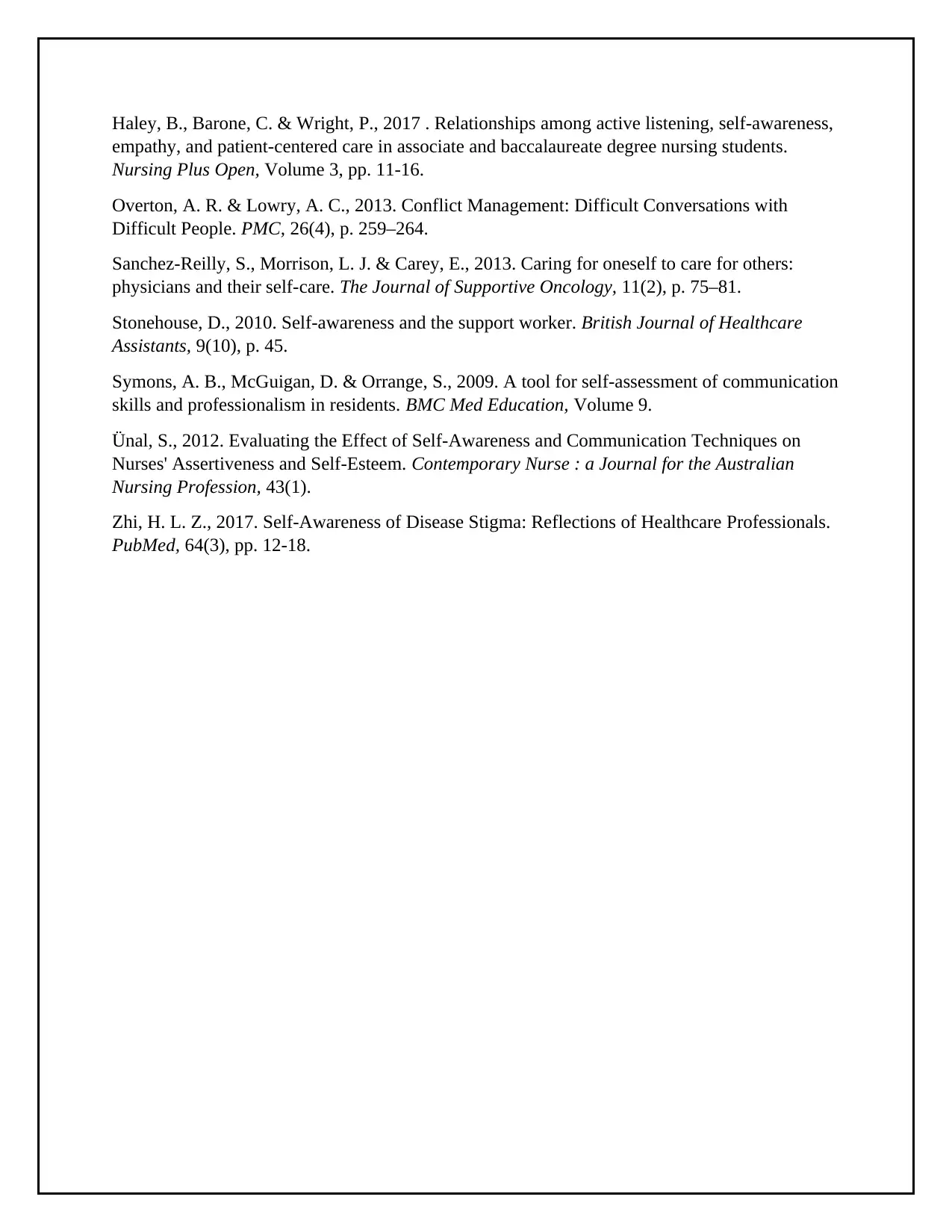
Haley, B., Barone, C. & Wright, P., 2017 . Relationships among active listening, self-awareness,
empathy, and patient-centered care in associate and baccalaureate degree nursing students.
Nursing Plus Open, Volume 3, pp. 11-16.
Overton, A. R. & Lowry, A. C., 2013. Conflict Management: Difficult Conversations with
Difficult People. PMC, 26(4), p. 259–264.
Sanchez-Reilly, S., Morrison, L. J. & Carey, E., 2013. Caring for oneself to care for others:
physicians and their self-care. The Journal of Supportive Oncology, 11(2), p. 75–81.
Stonehouse, D., 2010. Self-awareness and the support worker. British Journal of Healthcare
Assistants, 9(10), p. 45.
Symons, A. B., McGuigan, D. & Orrange, S., 2009. A tool for self-assessment of communication
skills and professionalism in residents. BMC Med Education, Volume 9.
Ünal, S., 2012. Evaluating the Effect of Self-Awareness and Communication Techniques on
Nurses' Assertiveness and Self-Esteem. Contemporary Nurse : a Journal for the Australian
Nursing Profession, 43(1).
Zhi, H. L. Z., 2017. Self-Awareness of Disease Stigma: Reflections of Healthcare Professionals.
PubMed, 64(3), pp. 12-18.
empathy, and patient-centered care in associate and baccalaureate degree nursing students.
Nursing Plus Open, Volume 3, pp. 11-16.
Overton, A. R. & Lowry, A. C., 2013. Conflict Management: Difficult Conversations with
Difficult People. PMC, 26(4), p. 259–264.
Sanchez-Reilly, S., Morrison, L. J. & Carey, E., 2013. Caring for oneself to care for others:
physicians and their self-care. The Journal of Supportive Oncology, 11(2), p. 75–81.
Stonehouse, D., 2010. Self-awareness and the support worker. British Journal of Healthcare
Assistants, 9(10), p. 45.
Symons, A. B., McGuigan, D. & Orrange, S., 2009. A tool for self-assessment of communication
skills and professionalism in residents. BMC Med Education, Volume 9.
Ünal, S., 2012. Evaluating the Effect of Self-Awareness and Communication Techniques on
Nurses' Assertiveness and Self-Esteem. Contemporary Nurse : a Journal for the Australian
Nursing Profession, 43(1).
Zhi, H. L. Z., 2017. Self-Awareness of Disease Stigma: Reflections of Healthcare Professionals.
PubMed, 64(3), pp. 12-18.
⊘ This is a preview!⊘
Do you want full access?
Subscribe today to unlock all pages.

Trusted by 1+ million students worldwide
1 out of 9
Related Documents
Your All-in-One AI-Powered Toolkit for Academic Success.
+13062052269
info@desklib.com
Available 24*7 on WhatsApp / Email
![[object Object]](/_next/static/media/star-bottom.7253800d.svg)
Unlock your academic potential
Copyright © 2020–2026 A2Z Services. All Rights Reserved. Developed and managed by ZUCOL.





